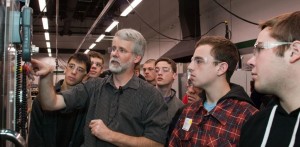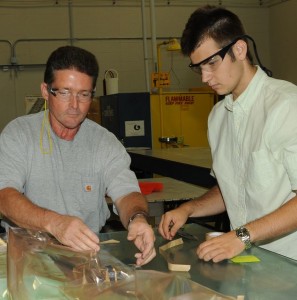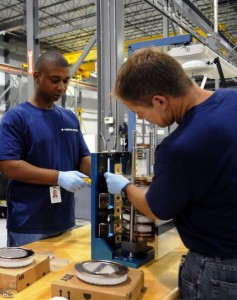An Incredible (and Daunting) Opportunity for Manufacturers
US manufacturing is an absolute behemoth of an industry. CNBC recently reported that manufacturers contribute over $2 trillion to the US economy each year, and remarkably, it’s still growing. Experts predict that over the next ten years, there could be more than 3 million jobs opening up in the manufacturing industry.
This is fantastic news for Massachusetts, whose manufacturing industry generates over $45 billion annually. The caveat, however, is that these 3 million new jobs need to be filled . . . fast. About 10,000 Baby Boomers retire every single day, and we’re now seeing the need for skilled workers to take their places. Who is going to step in?
Millennials.
No, we’re not kidding. This young generation, seemingly defined by selfie sticks and social media accounts, is rushing toward the workforce with skill sets and abilities we’ve never seen before. They’re no longer just kids, and like it or not, manufacturing companies need them—their futures depend on it. Companies in the manufacturing industry and elsewhere are realizing that the best (and possibly, the only) way to assure long-term success is to funnel Millennials their way. They’re now asking a few questions:
- Why would we want to hire Millennials?
- Why would they want to work for us?
- How do we make it happen?
Addressing the Stereotypes: Do Manufacturers and Millennials Even Want Each Other?
There is a huge elephant in the room, and it’s name is “The Age Gap.” Many manufacturing executives are Baby Boomers (born 1946–1964) and Generation X-ers (born 1965–1980); Millennials are those born between 1981 and the early 2000s. What this means is that the age gap between existing employees and new hires can stretch forty years or more. Bridging that gap in the workplace presents discernable challenges. As reported by ThomasNet, some employers are standing at one side of the divide and are about ready to give up completely; 81% of manufacturers “have no explicit plans to target Millennials as potential workforce replacements.”
 But here’s the cold, hard truth of it all: Yes, you are different. Yes, you are stuck with each other. A successful business in any industry can and must consider the values, strengths, and weaknesses of each of the three generations; as Baby Boomers fade out of the workforce and Millennials fade in, cohabitation becomes more important than ever. By 2025, up to 75% of the global workforce will be populated by Millennials. It’s time for manufacturers to recognize this inevitable shift or end up watching from the sidelines.
But here’s the cold, hard truth of it all: Yes, you are different. Yes, you are stuck with each other. A successful business in any industry can and must consider the values, strengths, and weaknesses of each of the three generations; as Baby Boomers fade out of the workforce and Millennials fade in, cohabitation becomes more important than ever. By 2025, up to 75% of the global workforce will be populated by Millennials. It’s time for manufacturers to recognize this inevitable shift or end up watching from the sidelines.
How Hiring Millennials Can Benefit Manufacturers
The most obvious service a Millennial can offer a manufacturing company is that he or she can fill an open position. In 2014, MA manufacturing companies saw a 67% increase in jobs created, which is a wonderful piece of data . . . if there are people willing to work those jobs. Millennials are here and ready to work.
Millennials also provide the intrinsic ability to reach other Millennials—they are fluent in the heavily trafficked pathways of social media, telecommunication, and technological innovation; they offer invaluable insight on how to make a company more attractive to others like them. This is especially important considering the fact that Millennials will soon not only make up the lion’s share of the workforce, but also that of the consumer and B2B market as well; if manufacturers fail to connect with them, their companies will continue to be understaffed and unable to grow.
 With regard to “going green” and reducing a company’s carbon footprint, Millennials are proving themselves to be the most informed generation yet. Many Millennials dedicate their educational careers studying in fields that that didn’t even exist when the Boomers and the Gen X-ers were in school, like the philosophy of sustainability, sustainable development, and the art and science of sustainability. Millennials are able to both fill the available positions in the industry and skillfully rejuvenate manufacturing to better align it with the times.
With regard to “going green” and reducing a company’s carbon footprint, Millennials are proving themselves to be the most informed generation yet. Many Millennials dedicate their educational careers studying in fields that that didn’t even exist when the Boomers and the Gen X-ers were in school, like the philosophy of sustainability, sustainable development, and the art and science of sustainability. Millennials are able to both fill the available positions in the industry and skillfully rejuvenate manufacturing to better align it with the times.
The US government published a report in 2014, “15 Economic Facts about Millennials,” that says Millennials have not only been “shaped by technology” and are therefore better prepared to help companies adapt to new technology, but are also more likely to stay with their early-career employers than previous generations. Despite those who say Millennials tend to bounce from employer to employer, they have actually held on to their jobs longer than Gen X-ers (see page 29 of the above report). This means more security for employers, improved worker productivity, and fewer resources spent on training new employees.
How Manufacturing Can Benefit Millennials
Money is on the mind of most Millennials these days—their lack of it, their paralytic fear of it, and the debt they have to chip through before they can begin to save any of it. The Wall Street Journal reports that students in the class of 2015 are the most indebted ever; each faces about $35,000 of student-loan debt. Even when adjusted for inflation, this blisteringly high figure has grown every year for as long as anyone can remember, and it’s reasonable to assume the trend will continue as we move forward. The good news? There is money in manufacturing. A lot of it.
In Massachusetts, the average median wage for a manufacturer hovers around $70,000. This is about the same salary as a software engineer, executive chef, or a seasoned firefighter. We can also compare this to the average salary of those who graduated with liberal arts degrees and have accumulated 10–19 years of experience. Entry-level manufacturing engineers make $50,000–$60,000 annually, markedly more than many employed in other industries. There are secure, well-paying, benefit-wielding careers waiting for Millennials to come pick them up.
In addition to terrific pay, manufacturers are now focusing their efforts on reaching Millennials and keeping them around. From internships, grants, and one-on-one workplace training to optimized, revitalized vocational programs and collaborative guides to help reach members of the community, the industry is shaping itself to be more appealing to the younger generation.
Using Manufacturing Day and Other Initiatives to Connect Millennials and Manufacturers
In 2012, a group of sponsors initiated Manufacturing Day, a project intended to attract young people to manufacturing, better define the industry, and address some misguided assumptions. This year, it was officially held on October 2, though there are events held throughout the year. One of the MA events included the Worcester Regional Chamber of Commerce’s event, “Made in Central Mass: Manufacturing Matters,” a panel that invited representatives from local manufacturers to brainstorm ways to market the industry to a new workforce.
Bill DiBenedetto, president of Lampin, a critical component manufacturer based in Uxbridge, MA, said this of the industry’s trajectory:
Manufacturing is a very robust and advanced industry in Massachusetts. I believe that it is incredibly important for us to collaborate with local educational officials and get more students interested in pursuing careers in manufacturing, where they have the opportunity to learn advanced engineering skills while earning a livable salary.
Lampin and other participants in Manufacturing Day, along with the STEM Education Coalition and the “30 Under 30” Rising Supply Chain Stars Recognition Program, are all hoping to funnel younger people into the industry. These organizations and others strive to show Millennials how much personal and professional growth can be achieved through manufacturing.
How Can You Get Involved?
If you or someone you know is entering the workforce, consider manufacturing. Sure, it isn’t for everyone out there, but it is a multifaceted, dynamic industry at least worth your research. A great way to start is to find a Manufacturing Day event near you. Find and follow manufacturers on social media, too—who knows, you or someone you know might be a perfect fit.






